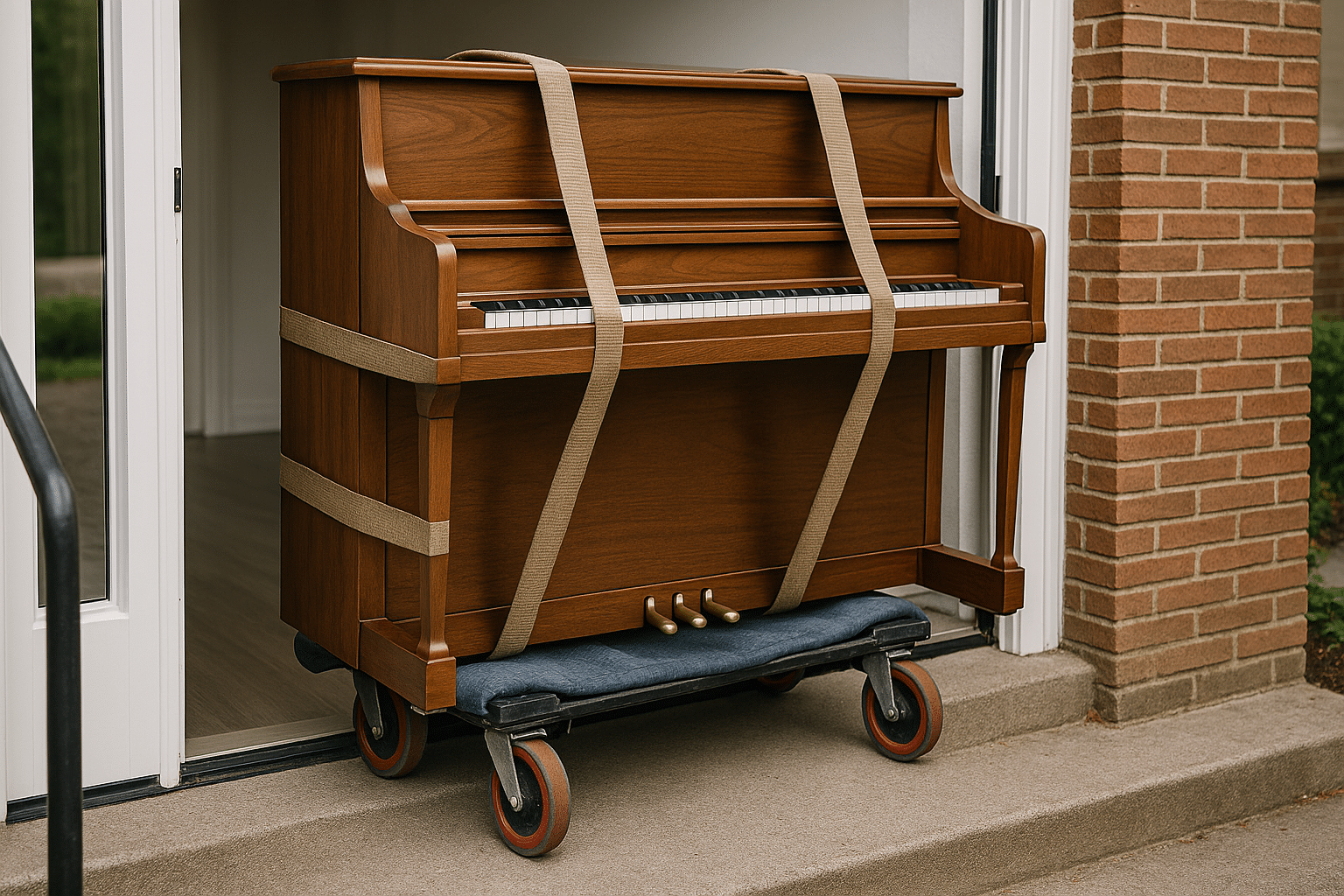Moving a Spinet Piano sounds simple — it’s small, right? You’d be forgiven for thinking you can shove it through a doorway, tie a couple of straps around it, and call it a day. Here’s the thing: a spinet is compact, yes, but it’s also awkward, heavy, and surprisingly fragile. If you’re a homeowner in Salt Lake City who cares about the finish, the tone, and the story behind a sentimental instrument, you want specialists on the job — not a friend with a pickup truck. Let me explain why professional spinet piano movers are essential and how Utah Piano Movers keeps your spinet safe from porch to parlor.
Contents
- 1 Why a spinet isn’t “just a small piano” (and why that matters)
- 2 What goes wrong with DIY moves (short list, long regret)
- 3 So what do professional spinet piano movers actually bring to the table?
- 4 How we handle spinet moves in Salt Lake City — a behind-the-scenes look
- 5 What you’ll save by hiring professionals (besides stress)
- 6 When should you call piano movers — and when might DIY be okay?
- 7 Quick tips for homeowners before movers arrive
- 8 Ready to keep your spinet safe? Let’s talk.
Why a spinet isn’t “just a small piano” (and why that matters)
On paper, a spinet looks easy to handle. It’s under five feet tall and fits into many tight spaces. But looks are deceiving. The action — the parts under the keyboard that make sound — is delicate. The wooden case can split or crack under uneven pressure. And the inner components are affected by temperature and humidity changes, something Salt Lake City winters and hot summers do often.
You know what? Many homeowners underestimate how much weight is concentrated in a compact frame. The center of gravity is tricky. Move it wrong and the whole thing tilts, scuffs, or even separates — yes, a small instrument can have big problems.
What goes wrong with DIY moves (short list, long regret)
Here’s the blunt truth: most DIY piano moves fail for reasons you can’t see until it’s too late.
- Hidden damage: Internal bracing and felts can shift; you might not notice until tuning problems crop up.
- Property damage: Door frames, walls, stairs — they’re easier to harm than a piano is.
- Personal injury: Pianos cause strains, sprains, and worse when handled without the right gear.
You’ll read stories: a scratched finish, a broken leg, a piano dropped on a winding staircase. They sound extreme, but they happen. Sometimes the cost of the fix is more than what you saved skipping pros. Oddly enough, trying to save money can end up costing you more emotionally, too — especially if that piano played for generations.
So what do professional spinet piano movers actually bring to the table?
Professionals bring skill, insurance, and the right gear. Let me spell that out in plain terms.
First, training. Moving a spinet isn’t muscle-only; it’s choreography. Movers learn how to distribute weight, how to pivot in tight spots, how to protect the action and case. They’ve hauled instruments through narrow Sugar House staircases, over slushy sidewalks in February, and into modern condos with glass elevators.
Then, tools. We use padded covers, heavy-duty straps, skid boards (piano boards), and specialty dollies made to cradle small upright instruments. Working with these tools reduces pressure points — so no cracking, no warped soundboard. We also protect your home: corner guards, floor runners, and custom bracing for stairwells.
Finally, insurance and accountability. When pros move your spinet, there’s coverage for accidents. That’s peace of mind you can’t get from a neighbor’s “I’ll help” promise.
How we handle spinet moves in Salt Lake City — a behind-the-scenes look
Here’s a little peek at our process: it’s methodical but flexible. Moves in the Avenues are different from moves in West Jordan. We adjust.
We start with a free on-site or virtual assessment. Measurements matter — doorways, stair widths, elevator dimensions, turns. Then we make a plan: path clearance, protective materials, and timing to avoid peak traffic or bad weather. Yes, timing — because hauling a piano during a sudden snowstorm is unnecessary drama.
On moving day, the spinet gets wrapped in quilted pads, secured to a piano board, and lifted by trained movers who communicate in short commands — there’s a rhythm to it. If stairs are involved, we use harnesses and team lifts. If a balcony move is safer, we consult rigging professionals. We tune our approach to match the home: historic brick townhouses in Capitol Hill need gentler handling than a ground-floor modern loft.
What you’ll save by hiring professionals (besides stress)
Let’s be practical. Hiring pros isn’t just about preventing disasters; it’s about saving time and keeping value intact.
- Time: A move that would take you and friends all afternoon is done in a fraction of the time.
- Money: Avoid hidden repair costs — scratches, soundboard repair, replacing felt, or tuning after a botched move.
- Longevity: Proper handling preserves tonal quality and resale value.
Honestly, the math usually favors professionals. You’re paying for expertise, and that often pays for itself.
When should you call piano movers — and when might DIY be okay?
Here’s a mild contradiction: not every move strictly requires pros. If you’re moving a spinet five feet on level ground, no stairs, and you have the right lifting equipment — fine. But that’s rare. In most cases, especially with older homes, stairs, tight corners, narrow elevators, or bad weather, you should call professionals.
Ask yourself: Can this move harm the instrument, my home, or someone’s back? If the answer is yes, then don’t hesitate. Call in the team.
Quick tips for homeowners before movers arrive
Preparation makes a pro’s job smoother and quicker. A few easy things you can do:
- Clear the path: Remove rugs, furniture, and tripping hazards along the route.
- Measure twice: Confirm doorway and stair dimensions, and tell your movers about any quirks (low light fixtures, tight turns).
- Protect floors: Lay down runners or cardboard where movers will travel — better safe than sorry.
These small steps shave time off the move and reduce risk. They’re practical and they matter.
Ready to keep your spinet safe? Let’s talk.
If you live in Salt Lake City and you’ve got a spinet — a family heirloom, a starter instrument, or a sentimental showpiece — don’t gamble. The right move preserves sound, finish, and memories. Utah Piano Movers knows local homes, tricky staircases, and the little things that make a big difference: the way an old townhome creaks, how winter salt eats at casings, the best time of day to move to avoid traffic.
Call us at 801-396-7323 or Request a Free Quote and we’ll walk you through the options. We’ll give you an honest assessment, clear pricing, and a plan that keeps your piano — and your nerves — intact.




